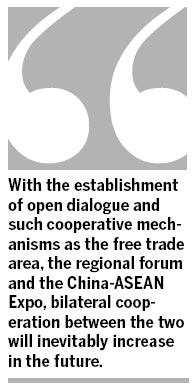Op-Ed Contributors
FTA pushes ASEAN ties
(China Daily)
Updated: 2010-08-24 09:41
 |
Large Medium Small |
Washington's intention to sow discord between China and Southeast Asian countries will be in vain
China and the Association of Southeast Asian Nations (ASEAN) are beginning to harvest tangible economic benefits two decades after a dialogue mechanism between the two was initiated.
A much-anticipated free trade area (FTA) between China and the regional bloc was formally launched in early 2010, which, with a $4.5 trillion trade volume, ranks as the world's third largest trade zone. The bilateral trade value in the first half of this year reached $136.5 billion, an increase of 55 percent year on year, and the figure for the full year is expected to total $250 billion.
|
 |
Amid the global financial crisis, and at a time when global economic recovery still remains a faint prospect, the enormous progress China and the ASEAN countries have achieved in the economic and trade field will undoubtedly help dissipate any clouds over their economic development.
With the establishment of such an FTA on a mutually beneficial basis, the structure of China-ASEAN economic ties has also changed to the latter's advantage. The 10-member bloc is now playing a different role than in the past, as China's robust demands for energy and raw materials make China and ASEAN counties economically complementary. In the first half of this year, China's imports from the Southeast Asian Nations increased 64 percent on the same period last year, and its exports to ASEAN increased 45 percent for the period year on year.
However, there also exists another factor that is trying to affect the continuing development of China-ASEAN ties: namely, the United States. Traditionally, Washington has regarded Southeast Asia as a strategic point to contain an emerging China. This Cold War mentality has not changed despite the region's declining strategic importance on the US' diplomatic chessboard over the past two decades. In recent years in particular the US has become more overt in using ASEAN countries as a buffer in its widespread rivalry with China's ever-growing power and influence.
This has resulted in the unpopular Cold War mentality becoming more noticeable. This can be seen in the recent remarks made by US Secretary of State, Hillary Clinton, and Robert F Willard, Commander of the US Pacific Command, that sovereign disputes involving the South China Sea are part of US national interests and that China's development will fuel concerns among regional countries. The joint military exercises held between the US and Vietnam and other Asian nations in the otherwise serene and peaceful South China Sea, have only added to tensions in the region.
These maneuvers further exposed Washington's long-harbored intent to sow dissent between China and ASEAN countries.
However, no matter how hard the US tries, the obsolete Cold War mentality is not expected to take root again in the region, due to the disappearance of the soil for its cultivation. After decades of booming cooperation and exchanges, mutual benefit and win-win have become the consensus of political and public opinion in China and the ASEAN countries. With the establishment of open dialogue and such cooperative mechanisms as the free trade area, the regional forum and the China-ASEAN Expo, bilateral cooperation between the two will inevitably increase in the future.
China and the ASEAN countries have pushed forward their cooperation in the Pan-Beibu Gulf, the Great Mekong River Basin and the Nanning-Singapore Economic Corridor, and in addition, their prospering economic and trade exchanges, educational and cultural exchanges have also deepened.
The wide-ranging and ever-expanding China-ASEAN cooperation has overshadowed the US' discord-sowing intent in the region, as indicated by ASEAN countries' lukewarm response to Washington's active interventions in their territorial disputes with China in the South China Sea.
For China, whether or not it can defuse the strategic dilemma caused by its emergence will decide its ties with ASEAN countries. Due to their historical dependency on China, ASEAN countries remain particularly sensitive to present-day China's attitude in its dealings with them. China should extricate itself from any sense of superiority in developing ties with ASEAN countries in order to create a peaceful and stable environment for its development.
To this end, the country should unwaveringly adhere to the principle of mutual benefit and strive to forge the hard-won FTA into a firm bond and promote mutual cooperation and development. The two sides should also try to fend off outside interventions and ease mutual misgivings towards each other in the South China Sea dispute in an effort to turn the sea into an area of peace and cooperation.
The "harmonious world" concept advocated by China indicates the country is committed to safeguard, rather than revise, the current regional order. China's commitment not to devalue its currency during the 1997 Asian financial crisis, a move that helped crisis-stricken Southeast Asian nations recover, best proved that the country can undertake its responsibilities as a responsible power in any global and regional crisis.
The author is an associate professor at the School of International Studies of Nanjing University.